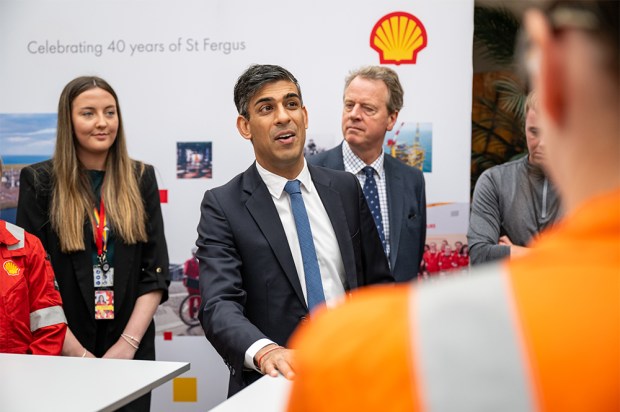When fossil fuel divestment was merely a gesture by universities, the Church of England and the Prince of Wales it was easy to ignore; it is rather less so when the head of the world’s largest fund management company says that he is going to start ‘exiting investments’ in coal producers and other companies he claims represent a ‘high sustainability–related risk’. That is what Larry Fink of Blackrock, which manages £5 trillion worth of investors’ money, did in a letter to business leaders this week, citing last year’s climate change protests as evidence that attitudes were changing.
This fits a more general trend of ‘woke capitalism’, whereby companies that would not dream of taking sides in party political battles enter the culture wars. Much of the fight takes place in the workplace, especially in human resources departments, which have started introducing some of the crazier ideas to have fomented on university campuses. So workers, like students, are becoming fearful of expressing opposition to identity politics initiatives lest they are seen as bigots.
The companies most afraid of the mob — usually banks and oil companies — have in recent years started to adopt the language of their critics. BP has rebranded itself ‘Beyond Petroleum’, as if to position itself as being somehow opposed to the extraction of oil and gas. If BP won’t make a basic defence for the important role fossil fuels currently play in our society, or if banks are too terrified of talking about the benefits of a financial services industry, they should not be surprised if those who oppose them are emboldened — and if politicians then join in.
That the world needs to reduce carbon emissions has been widely accepted for some time now. And consumers are becoming more aware of how their daily choices can make a difference. The free market system is a daily referendum, where customers show their preferences through their purchases and companies respond. This has already been a huge driver of environmental improvement: Britain’s CO2 emissions peaked in 1973 and are now at their lowest level since Victorian times. Air pollution has plummeted since then, with sulphur dioxide levels down 95 per cent. Britain’s population is rising but our energy consumption peaked in 2001 and has since fallen by 19 per cent.
These figures are rarely mentioned, because they contradict the gloomy narrative being pushed by government and now, bizarrely, by the corporate world. The progress of recent decades has happened not because of government diktat, but due to technical innovations by entrepreneurism: people dislike paying too much for fuel, and new technology helps do more with less.
Britain now has the target of achieving net zero carbon emissions in 30 years’ time. This goal can only be achieved if technology and the free market work together. To shun investment in coal, oil and gas producers — treating them as pariahs in the way that groups like Extinction Rebellion do — might help keep protesters at bay for a bit. But far from helping the planet, it could slow down the transition to clean energy. Last year Shell announced that it intends to double its investment in wind, solar and other green energy to £3 billion a year. No doubt there would be whoops of joy from climate campaigners if oil companies were driven out of business tomorrow, but renewable energy would take a huge hit if they were.
Coal producers such as Glencore are helping to fuel the steel industry. Without steel, there would be no wind farms, solar farms or reconfiguration of the electricity grids (necessary in order for low-carbon electricity to be taken up). We might one day be able to produce steel without coal, but we do not yet have the technology to do so economically. The big miners are also heavily involved in the mining of metals which are needed for the transition to battery-driven vehicles.
Extracting coal, oil and gas from the ground is not an antisocial act which calls for punishment by ‘enlightened’ bankers; it is part of a process that has transformed living standards beyond all recognition over the past two centuries, and on which we will continue to rely for decades to come. It is not as if fossil fuel companies are responsible for burning all that they have extracted — most of that material is used by our cars, boilers and so on. If burning fossil fuels is a crime against the environment, we are all implicated.
So a company like Blackrock announcing its decision to sell its fossil fuel investments shows how easy it is to bully a large corporation. Companies that respond to such pressure can expect plenty more of it. Climate change has become a vehicle on which many activists have leapt in order to attack capitalism itself. It isn’t just carbon emissions they want to eliminate, but also profit, capital and, according to the manifesto on which Extinction Rebellion was launched, even interest-bearing loans.
Corporate Britain should be wary of following Corporate America by seeking to project their ‘values’ through taking sides in culture wars. The idea that consumers across the UK are wildly in favour of Corbynista ideas was lent some perspective by the election result. The energy, banking and tech giants have good stories to relate — but they seem to lack the courage to do so. To adopt self-defeating policies is unlikely to make things better for them or anyone else.
Got something to add? Join the discussion and comment below.
Get 10 issues for just $10
Subscribe to The Spectator Australia today for the next 10 magazine issues, plus full online access, for just $10.
You might disagree with half of it, but you’ll enjoy reading all of it. Try your first month for free, then just $2 a week for the remainder of your first year.














Comments
Don't miss out
Join the conversation with other Spectator Australia readers. Subscribe to leave a comment.
SUBSCRIBEAlready a subscriber? Log in